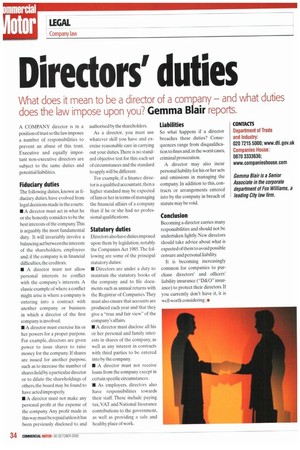Diredors' duties
Page 34

If you've noticed an error in this article please click here to report it so we can fix it.
What does it mean to be a director of a company — and what duties does the law impose upon you? Gemma Blair reports.
A COMPANY director is in a position of trust so the law imposes a number of responsibilities to prevent an abuse of this trust. Executive and equally important non-executive directors are subject to the same duties and potential liabilities.
Fiduciary duties
The following duties, known as fiduciary duties, have evolved from legal decisions made in the courts: • A director must act in what he or she honestly considers to be the best interests of the company. This is arguably the most fundamental duty. It will invariably involve a balancing act between the interests of the shareholders, employees and, if the company is in financial difficulties,the creditors, • A director must not allow personal interests to conflict with the company's interests. A classic example of where a conflict might arise is where a company is entering into a contract with another company or business in which a director of the first company is involved.
• A director must exercise his or her powers for a proper purpose. For example, directors are given power to issue shares to raise money for the company. If shares are issued for another purpose, such as to increase the number of shares held by a particular director or to dilute the shareholdings of others, the board may be found to have acted improperly.
• A director must not make any personal profit at the expense of the company. Any profit made in this way must be repaid unless it has been previously disclosed to and authorised by the shareholders As a director, you must use whatever skill you have and exercise reasonable care in carrying out your duties. There is no standard objective test for this: each set of circumstances and the standard to apply will be different.
For example, if a finance director is a qualified accountant,then a higher standard may be expected of him or her in terms of managing the financial affairs of a company than if he or she had no professional qualifications.
Statutory duties
Directors also have duties imposed upon them by legislation. notably the Companies Act 1985. The following are some of the principal statutory duties: • Directors are under a duty to maintain the statutory books of the company and to file documents such as annual returns with the Registrar of Companies. They must also ensure that accounts are produced each year and that they give a -true and fair view" of the company's affairs.
• A director must disclose all his or her personal and family interests in shares of the company. as well as any interest in contracts with third parties to be entered into by the company.
• A director must not receive loans from the company except in certain specific circumstances.
• As employers, directors also have responsibilities towards their staff. These include paying tax. VAT and National Insurance contributions to the government, as well as providing a safe and healthy place of work.
Liabilities
So what happens if a director breaches these duties? Consequences range from disqualification to fines and, in the worst cases, criminal prosecution.
A director may also incur personal liability for his or her acts and omissions in managing the company. In addition to this, contracts or arrangements entered into by the company in breach of statute may be void.
Conclusion
Becoming a director carries many responsibilities and should not be undertaken lightly. New directors should take advice about what is expected of them to avoid possible censure and personal liability.
It is becoming increasingly common for companies to purchase directors' and officers' liability insurance ("D&O" insurance) to protect their directors. If you currently don't have it, it is well worth considering .• CONTACTS Department of Trade and Industry: 020 7215 5000; www.dti.gov.uk Companies House: 0870 3333636: www.companieshouse.com Gemma Blair is a Senior Associate in the corporate department of Fox Williams. a leading City law firm.




























































































































































































